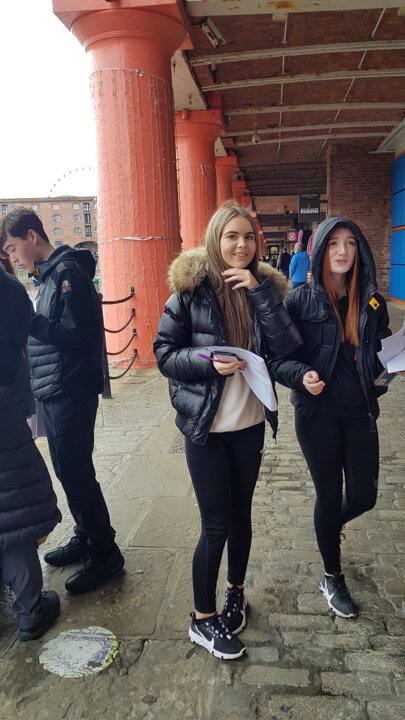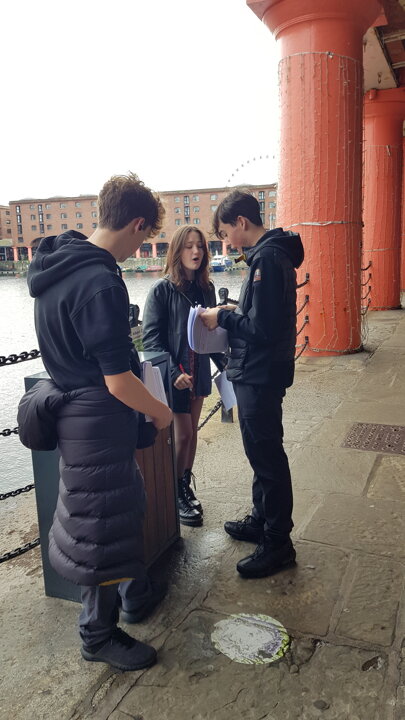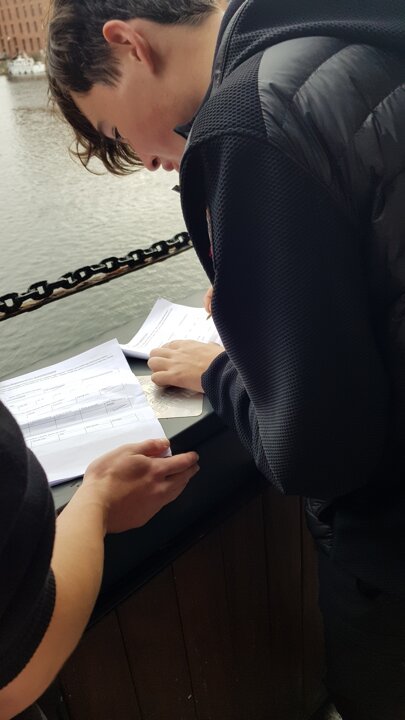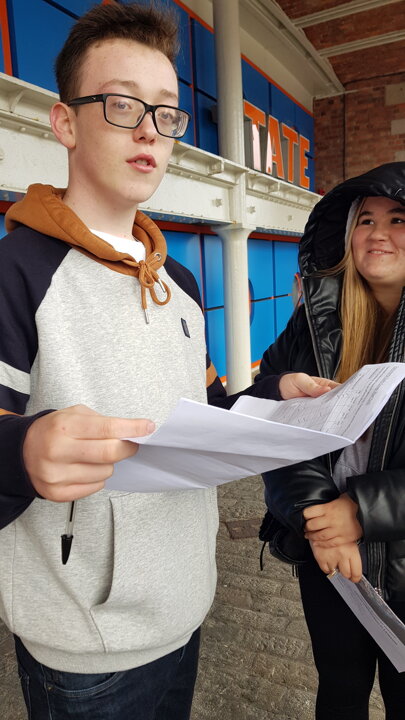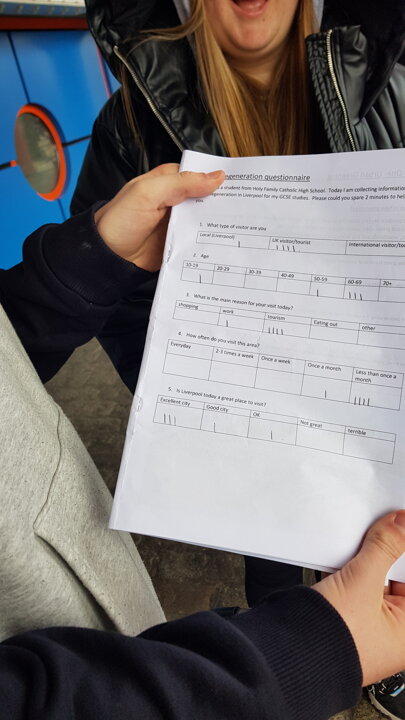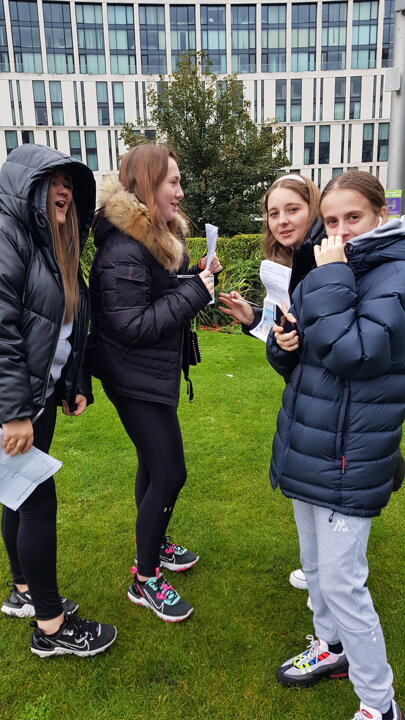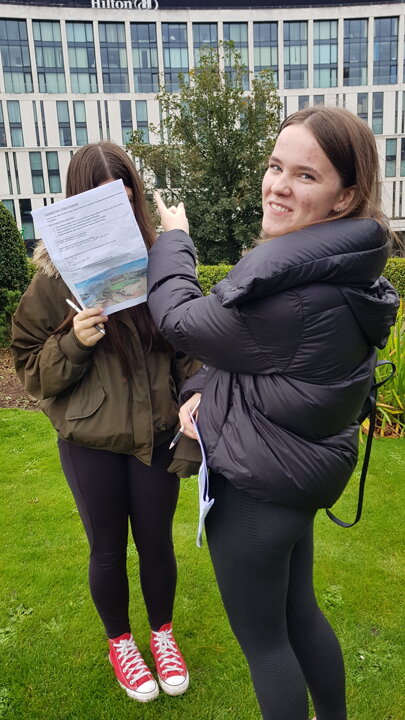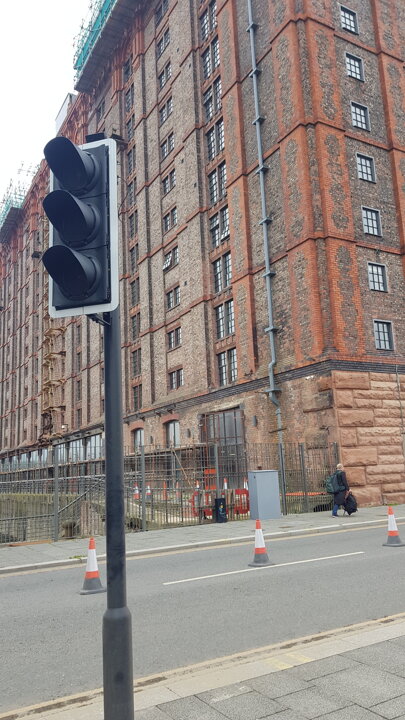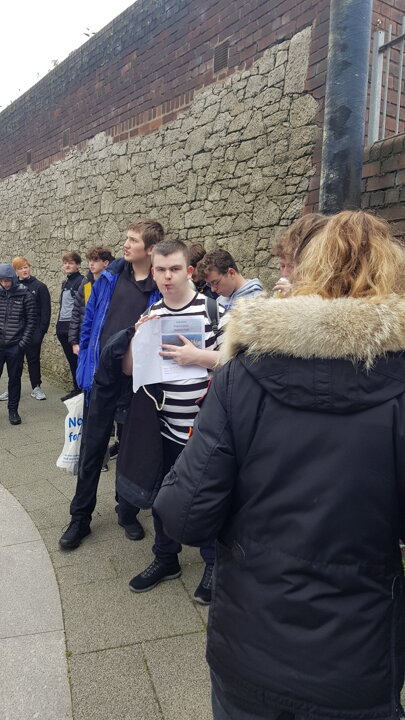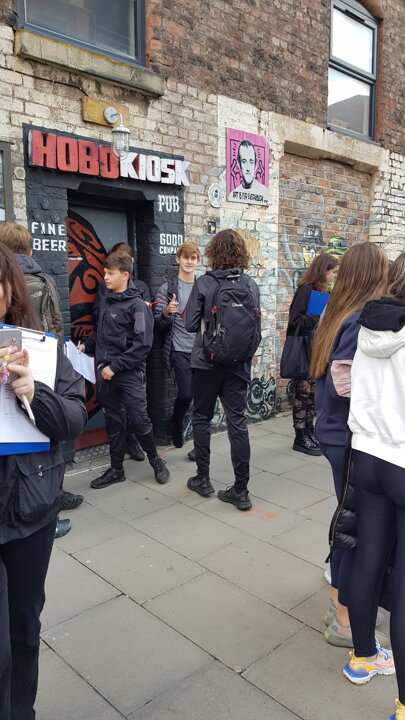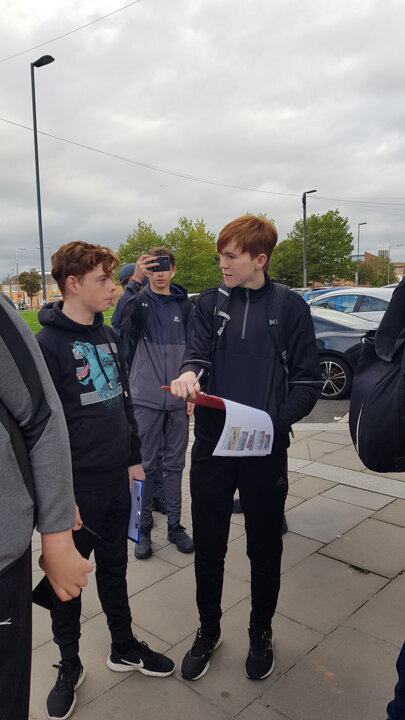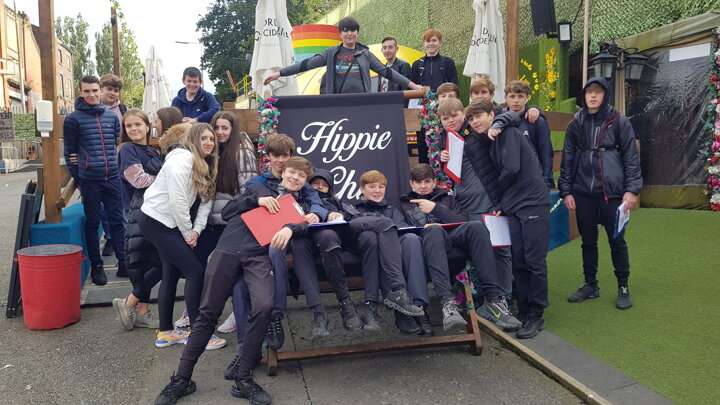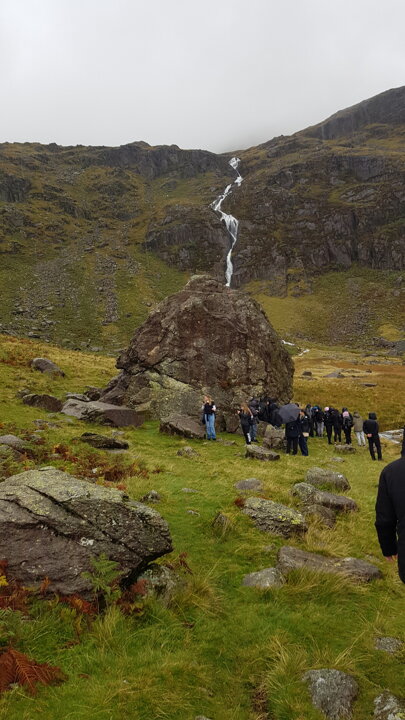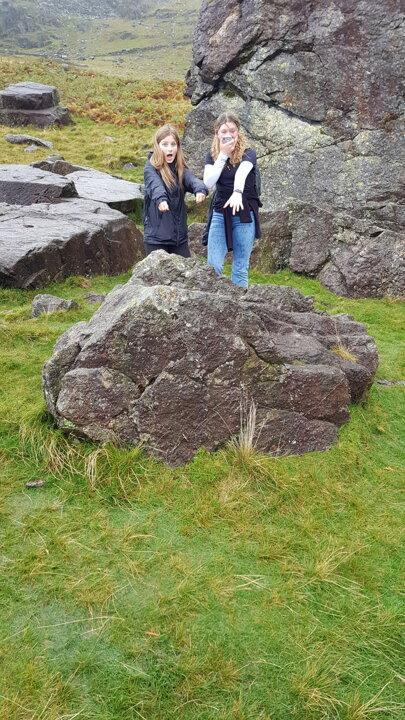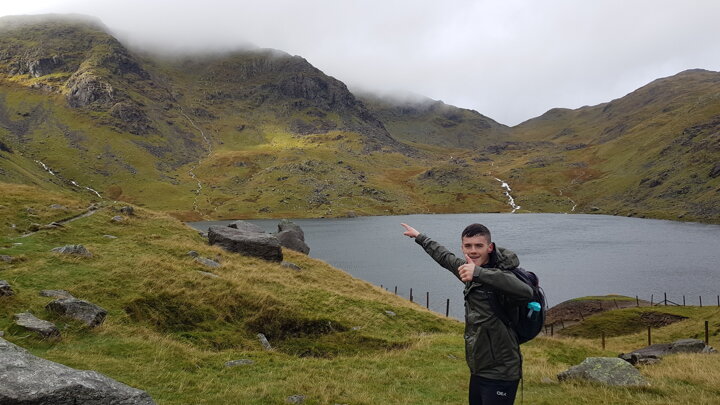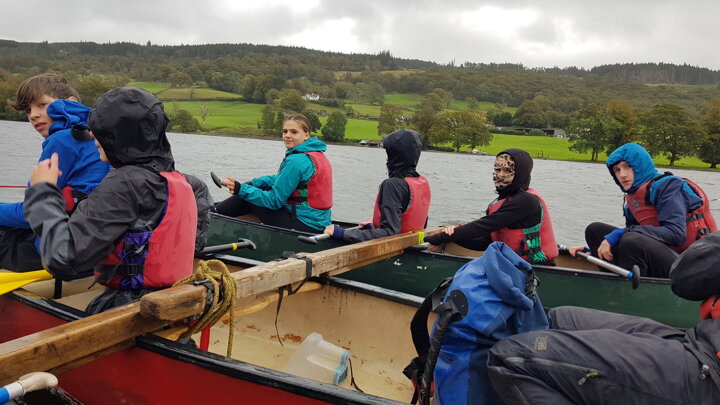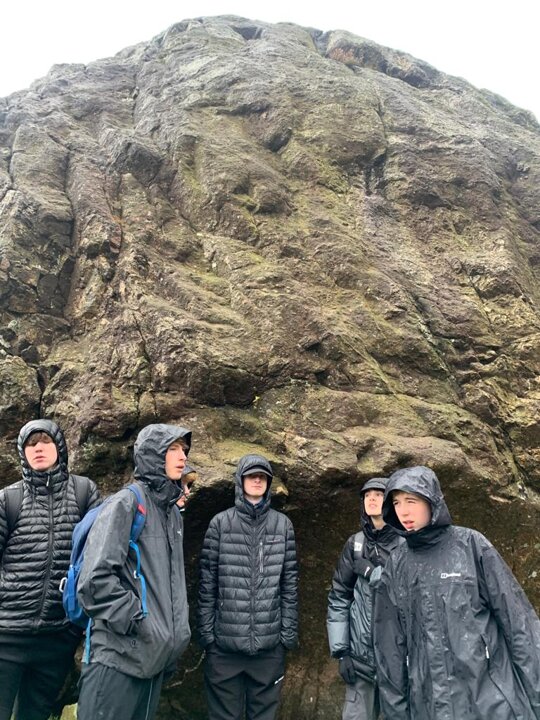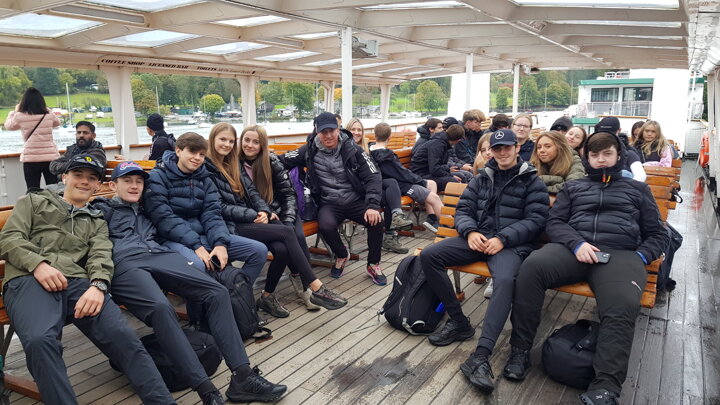Welcome to Geography
Head of Department - Mrs V. Taylor
Geography intent
At Holy Family our aim for Geography is for all students to gain a sense of curiosity and fascination about the complex world in which they live. We want our students to appreciate their natural environment, inspire them to make a difference and to take some responsibility for our geographical futures. Geography will enable students to;
- Gain detailed locational knowledge.
- Have a deep understanding about places in the world.
- Understand the complex interactions between human and physical processes. Leading to our students being ‘Geography thinkers’
- Develop Geographical skills which are transferable to many subjects and future opportunities.
- Provide opportunities for cultural capital and develop moral insights into issues.
Geography is an investigative subject, which develops an understanding of concepts, knowledge and skills. Students will investigate a range of places both in Britain and abroad to develop their understanding of the physical and human processes which are shaping our planet. Our Geography curriculum enables students to develop knowledge and skills that are transferrable to other curriculum areas, while also equipping our pupils with the necessary skills and tools to prepare them for life after Holy Family.
Implement
At KS3, students will follow on from their KS2 curriculum with a skills topic, ‘How to be a Brilliant Geographer!’. This enables pupils to demonstrate the skills learnt at KS2 and to be challenged to develop their ability in the geographical skills needed for KS3. Our Year 7 pupils will then develop their understanding of the key concepts and processes early to support them in developing deeper understanding of the human and physical interactions and understanding how complex the world is. Pupils will use this foundation of the key concepts and processes throughout their learning at KS3. Geographical skills are worked into the curriculum throughout the teaching of topics for example globes and maps are taught in topic 1, Y7 and then globes and maps are used again in World Development to locate countries, then again in their topic on Africa, then again looking at global weather patterns at the end of Year 7. At KS3, students will experience a truly global learning journey, from the local, such as new housing development on the Broom Cross road to global issues of climate change and the Willow Project. We as a department endeavour to keep Geography current and relevant for our pupils so that Geography is not only engaging but pupils can see how it links to their lives.
At Holy Family our department fully believes in utilising the local area to achieve desired outcomes, with opportunities for learning outside the classroom embedded in practise. School trips and fieldwork are provided to give first hand experiences, which enhance children’s understanding of the world beyond the classroom.
At Key Stage 4, our aim is to build on their passion for Geography and encourage students to widen their knowledge and skills acquired at Key Stage 3 and to be successful in their GCSE exams. Our Key Stage 4 curriculum allows pupils to gain a greater understanding of both physical and human Geography. The topics are taught alternating human and physical geography so that pupils can develop a greater understanding of the human and physical interactions. Geographical skills are a fundamental part of KS4 and these are developed further from their KS3 curriculum. Statistical skills are taught exclusively first and then Geographical questions applied. Curriculum co-ordination occurs between the maths department and Geography in supporting pupil understanding of the statistical skills required for GCSE Geography.
To enhance the experience of Geography at Holy Family and provide further outdoor learning. We provide a coastal sand dune visit to study succession, a urban regeneration visit to Liverpool and a three day residential to Lake Coniston to gain deeper understanding and insight into glacial landscapes and to give students an extra experience outside of the classroom to enrich their lives, friendships and cultural capital.
Impact
Our Geography Curriculum will develop student’s geographical knowledge and skills to help them explore, navigate and understand the world around them and their place in it, becoming ‘critical thinkers’. Our curriculum will allow students to progress as they move through the school. If children are keeping up with the curriculum, they will have a deep understanding of issues relevant to them, both locally and globally.
By the time young people leave Holy Family they will:
- Have an excellent knowledge of where places are and what they are like.
- Have an excellent understanding of the ways in which places are interdependent and interconnected and how much human and physical environments are interrelated.
- Have an extensive base of geographical knowledge and vocabulary.
- Be fluent in complex, geographical enquiry and the ability to apply questioning skills and use effective analytical and presentational techniques.
- Have the ability to reach clear conclusions and develop a reasoned argument to explain findings.
- Be highly developed in using statistical skills geographical skills and mapping analysis.
- Have a passion for and commitment to the subject, and a real sense of curiosity to find out about the world and its people.
- Have the ability to express well-balanced opinions, rooted in very good knowledge and understanding about current and contemporary issues in society and the environment.
- Be a well-rounded, thoughtful young person with empathy, compassion and understanding for all people in our world and to truly believe in equality.
Key Stage 3
Key Stage 3 is a continuous course which builds upon the foundation of Key Stage 2. We aim to develop student’s locational knowledge, their understanding of places, how humans interact with the physical environment in those places and their geographical skills throughout Key Stage 3. By the end of Key Stage 3 we want pupils to be confident and have a detailed understanding of the complex world, how it was formed, how it changes and the current global issues we all face. At Key Stage 3 students enjoy a wide range of topics from key concepts such as Development to How our Climate is changing. The Key Stage 3 curriculum is developed to allow progression and embed knowledge and understanding that prepares students adequately for Key Stage 4. Our topics are a mixture of Geographical themes and Places and meets all the requirements of the Key Stage 3 National Curriculum.

Geography Key Stage 3 Curriculum Maps
|
YEAR |
TOPIC |
Unit of work title |
Coverage of KS3 NC |
Rational |
Opportunities for progression |
|
8 |
1 |
Fascinating Places |
Study place based examples. Extend their location knowledge in understanding processes in real locations. |
This topic is a great start for Y8. Sparking their curiosity in the global world around them. Introducing geographical skills and issues while never dampening their engagement in learning. |
Develop mapping skills, describing distribution. Looking at human impacts and processes. |
|
8 |
2 |
Population Pressure |
Human geography relating to population. |
This topic aims to provide students with an opportunity to discuss an issue that affects us on and to develop a balanced view about the positive/negative aspects of population growth. |
Concept of a changing world. History of Britain and how development affected population growth. |
|
8 |
3 |
Risky Places |
Physical geography relating to geological timescales and plate tectonics. |
This topic gives Y8 fantastic understanding of how the world formed and the impact of this on the interactions and processes they will learn about in the future. |
Introduces plate tectonics. Develops understanding of the physical processes acting upon the earth.
|
|
8 |
4 |
Are we running out? |
Human geography relating to the use of natural resources. |
This topic provides students with a decision making exercise to widen their ability to debate and form arguments. The topic focuses on differing viewpoints and uses a local study of fracking to make geography real. |
Improves debating ability. Extended answers. Final topic of GCSE covers resources. |
|
8 |
5 |
Asia |
Extend their locational knowledge of Asia. Focus on an environmental region. |
This topic looks at one of the most influential continents. Students will develop their spatial awareness of the continent and look at its growing economy. Investigating Asian biomes to compare with Africa. Investigate China. |
Practise their mapping abilities. Population distribution. Further build on knowledge of biomes from Africa Y7. |
|
8 |
6 |
Middle East |
Extend locational knowledge- Middle East. Focus on environmental regions, hot deserts, human and physical features. |
This unit builds on pupils ability to locate regions and to suggest their physical and human characteristics. Students will study the climate and resulting biomes, to add to the picture they have already built of the world. Students will look at the resources of the middle east and how this has transformed wealth. The topic will also give students the opportunity to learn about geopolitics and conflict. |
Progression of tectonics with rift valley. Introducing air circulation from desert regions to progress weather knowledge. |
|
8 |
7 |
Sustainability |
Use of natural resources. |
This short topic develops student’s awareness of human impacts. Three issues will be used to develop their ability to research, debate, justify their opinions and choices. |
Extended writing High level thinking skills and questioning. How humans are influencing and changing landscapes. |
|
9 |
1 |
Key Geography |
Geographical skills |
This topic focuses of skills to access GCSE Geography and those that should have been developed throughout KS3. A variety of maps are studied, statistical skills are taught exclusively. |
To embed the key mapping and statistical skills required by the end of KS3. Opportunity assess students ability, fill gaps and stretch those with solid understanding further. |
|
9 |
2 |
Russia
|
Developing awareness of major global areas/regions |
This topic aims to consolidate all the skills, human and physical processes into studying Russia. Students also study adaptation to different environments and how climate change is affecting the biggest country on earth. |
Mapping ability. Moving forward to developing a balanced consider view of climate change. Political geography and the use of natural resources. |
|
9 |
3 |
Extreme weather & climate change |
Physical processes. Weather & climate |
This topic aims to introduce students to the impacts of weather rather than the causes. It gives pupils the opportunity to discuss what weather is affecting the UK. Students will then investigate climate change-causes, impacts and how to manage. |
Impact maps of climate change. How severe storms develop. Scientific understanding of climate change Progression from weather & climate |
|
9 |
4 |
Ecosystems: Tropical Rainforest |
Extend locational knowledge Use of resources. Climate change |
An introduction to earth and its biomes, both big and small. We take a look at our own local ecosystems such as our school and Calderstones Park. Students will study the tropical rainforest and why it is being used for its natural resources. Students will then look at impacts and managing the destruction that man causes. |
Prior knowledge from KS2. Decision making exercise on using resources. Using knowledge of climate change and carbon sinks. |
|
9 |
5 |
Glaciation |
Change in climate from the ice age until present. Glaciation |
Students will look at how the climate has changed since the last ice age and the conditions in Britain at the time. Students will investigate glaciers on earth today and the impact of a warming climate. Further investigation into physical processes such as erosion and the landforms created. Students will investigate a glacial landscape in Britain. |
Developing knowledge of physical landscapes from Y7. Deeping deeper into understanding the formation of glacial features that pupils looked at in Y7. |
Assessment
Assessment across KS3 includes one at the end of each themed topic, the three small topics 4 lessons or less have no formative end assessment. Each year 3 assessments are in the form of timed assessments comprising of a mixture of multiple choice, short answer and extended answer which are designed to allow access to the assessment for all ability ranges. In Y7 one assessment is a geographical investigation designed to improve fieldwork and data analysis skills as specified in the national curriculum. In Y8 one assessment is a decision making assessment that gives pupils a chance to develop clearly constructed arguments about a local issue.
There is a strong local context throughout our curriculum including;
- Skills topic at the start of Y7 focussing on the local area and NW.
- Investigating regeneration around the Leeds/Liverpool canal
- Employment change and jobs in Liverpool / North-West
- Coastlines in Y7 topic 3 which looks at erosion in Southport and Crosby and the risks of coastal flooding.
- Fracking in Y8 which looks at Formby and the Alt Car site.
- Study of Liverpool and the changes (redevelopment) that has taken place.
Homework
Pupils at KS3 are given a variety of tasks to enable all students to engage with at home learning. Some topics have differentiated menus where each pupil is able to challenge themselves and pick homework from a wide range of choices and challenge levels. Each activity is directly linked to a lesson, further enhancing their learning. Some topics have a project based homework such as Fascinating Places, where each week pupils must use what they have learnt in the lesson to directly apply to another Fascinating Place of their choice. Challenge tasks are set each week beyond the normal homework. Finally some topics require weekly homework to support learning such as exam style practise questions using structure strips in preparation for assessments.
Key Stage 4
Geography is an exciting and diverse subject to study at GCSE, not least because it lends itself to a wide variety of careers including, environmental professions, city planning, renewable energy, economics, flood protection and prevention, travel and tourism. At GCSE pupils follow the AQA specification, a course that is relevant and engaging. The AQA course allows pupils to study topics that have proven to be interesting and topical to them such as world natural hazards and more local issues such as re-development and changes within Liverpool and the local area.
The AQA course that we have chosen, helps put students on the path to becoming geography specialists by giving them skills and knowledge relevant to the modern age. The qualification covers a mixture of both physical and human geography as well as current issues and enquiry. Topics covered are:
- The challenge of natural hazards
- Ecosystems, Tropical rainforests and cold environments
- UK landscapes: rivers and coasts
- Urban issues and challenges
- The changing economic world
- The challenge of resources: energy
- Geographical application: fieldwork and issues evaluation
The optional topics chosen at GCSE for our pupils are coasts and energy for the following reasons;
- The school is located in a coastal location (Sefton) so the topic is directly relevant to our students.
- Assess for all pupils to local fieldwork.
- Our local area and the north-west has been the subject of two fracking applications, there are local energy issues.
- There are ample opportunities very close to our school to develop fieldwork skills.
Finally choosing AQA means that pupils have the opportunity to complete and issues evaluation exam. This exam focuses on pupil’s ability to make decisions and develop coherent arguments to support their points (something pupils at Holy Family are good at). This specification also has fieldwork as an integral part of the course. Students will complete a minimum of two days of fieldwork in contrasting local locations. This opportunity gives students a chance to develop their local geography, and their ability to collect, analyse and manipulate numerical data.
The table below shows how the course is assessed.
| Which part of the GCSE? | What does this involve? | When? | What percentage of the course? |
|---|---|---|---|
| Paper 1 | All questions in this exam will relate to physical geography. You will be asked a mixture of data response questions and using case studies |
Summer Year 11 |
37.5% |
| Paper 2 | All questions in this exam will relate to human geography. You will be asked a mixture of data response questions and using case studies. |
Summer Year 11 |
37.5% |
|
Geographical Application |
Two pieces of fieldwork completed in Y10 and Y11. You will be questioned on your fieldwork. You will also be given a current issue to investigate and learn about e.g. building 400 new homes on the island of Anglesey. You will be asked to evaluate the pros and cons of any development or issue. |
During Year 10 |
25% |
Enrichment
Year 7 - Litter Investigation Holy Family grounds.
Year 7- Infiltration Enquiry Holy Family Grounds.
Year 7- Weather Enquiry Holy Family Grounds.
Year 8 - Logger Heads river channel Enquiry
Year 9- Chester Zoo workshop and zoo visit.
Year 9- Grasmere tourism impacts Enquiry
KS3 Eco Club
Y10 - Sand dune Succession Enquiry, Ainsdale dunes.
Y10- Residential to Lake Coniston, glacial landscapes, water sports.
Y11- Urban Regeneration Enquiry, Liverpool.
Geography EXTRA club - Tuesday and Wednesday after school
Small group lunch intervention- breaking through the literacy
Whole school themes/ enrichment through form time and assemblies- COP, Earth Day, Population growth, Single use plastic awareness, Ocean Day, Fair Trade week.
Resources
The following websites are useful to all pupils studying geography. You can either have a general look through them or use them when you have been set a specific piece of work by your teacher.
| www.geography.org.uk/ | This is the UK's geographical association website. It contains lots of good articles, information and advice on choosing geography as a GCSE and A level subject and it tells you how geography can help you in future careers. |
| www.rgs.org/ | This is the home of the royal geographical society. Again they have information on geography as an option choice. They have maps and up to date geography in the news information. |
| www.geographyalltheway.com | This is a useful website as it has some general geography information and then it is broken down into a section for each year group with different topics for each group. |
| https://www.cia.gov/library/publications/the-world-factbook/ | This website has fact files on every country in the world. It includes maps, flag and facts about the social, economic and environmental factors of each country. |
| www.geography.learnontheinternet.co.uk/ | This website is broken down into KS3 and GCSE sections and it has interactive sections and a gallery of images. |
| www.gatm.org.uk | This website has short movie clips on various geography topics. These could be helpful for your homework or for revision. |
| www.bbc.co.uk/weather/ | Useful for information when studying weather and climate. |
| www.bbc.co.uk/schools/gcsebitesize/geography/ | This is useful for both pupils at KS3 and GCSE when they are studying for assessments and exams. Just go the homepage and search for the relevant topics. |
| https://www.metoffice.gov.uk/weather/learn-about/met-office-for-schools/resources-for-11-14 | Another useful website for weather and climate information. This includes lots of case studies that we cover in class. |
| Lots of good information on trade and aid and real-life stories. | |
| http://www.ordnancesurvey.co.uk/mapzone/ | This site has lots of work on improving your map skills and interactive games |
| www.zoopla.co.uk/ | This site can be used to find data on particular areas and places. |
| http://geography-site.co.uk/pages/links.html | This site has lots of links to different topics. |
| http://www.worldatlas.com/aatlas/world.htm | This is a good site for general facts and atlas work. |
| http://www.bbc.co.uk/learningzone/clips/ | A good selection of short videos on a variety of topics. |
Careers in Geography
As a degree subject, geography is highly respected by employers. Geography graduates have one of the highest rates of graduate employment, pursuing a wide range of career paths. It’s often said that there is no such thing as a geography job; rather there are multiple jobs that geographers do. Whether you have just completed a geography degree, or are thinking ahead to your next steps and are planning what to do after it, we have information about your employability, work experience and career options, including advice about postgraduate study, how to plan your career, and how to find and apply successfully for jobs.
Things to consider when choosing a career:
- Which aspects of geography do you enjoy?
- Do you prefer to work in a team or by yourself?
- Which of your geographical skills are your strengths?
- All jobs need broad, transferable skills. Think about how you have a portfolio of skills
Example careers using Geography
If you studied geography, your degree will have actually provided you with strong research and analytical skills, which are highly regarded by many employers.
Plus, if you want to make a difference to the world, studying geography is a good place to start. Geography careers offer opportunities to develop solutions to some of the most pressing issues for modern society, including climate change, natural disasters, overpopulation, urban expansion, and multicultural integration.
The career path you choose may depend on whether you have studied physical geography or human geography. The former is a natural science, focusing on the Earth’s physical materials and processes, while the latter is a social science, focusing on issues relating to human communities and cultures.
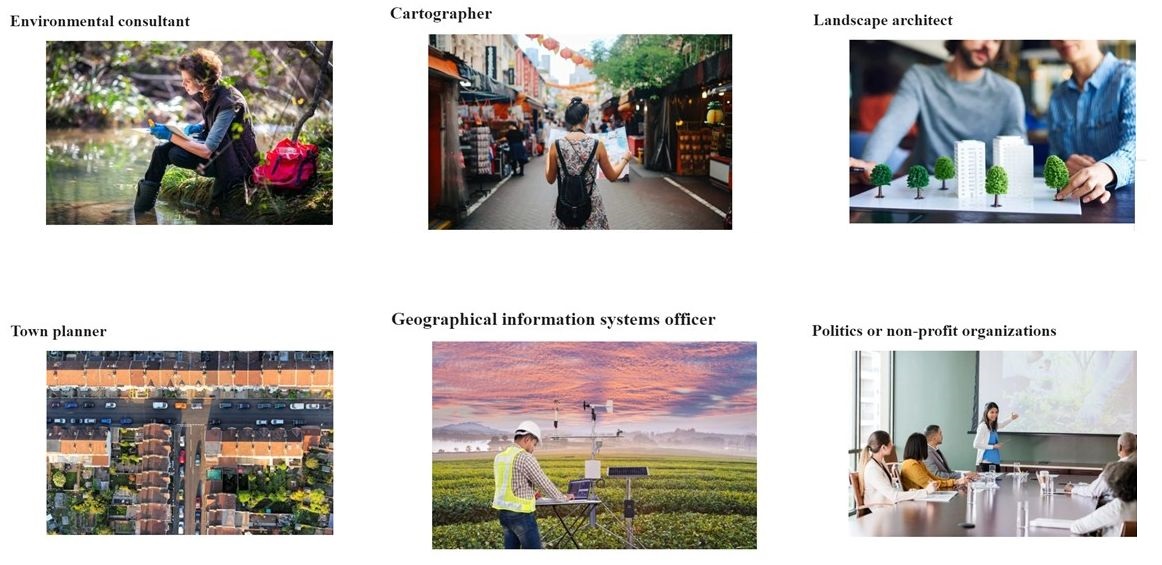
Further jobs linked to studying Geography
- Lawyer/Environmental lawyer
- Journalist
- Weather forecaster
- Catastrophe management
- Landscape architect
- Teacher
- Transport planner
- Landscape planner
- MP / politics
- Navy
- Travel writer
- Urban planner
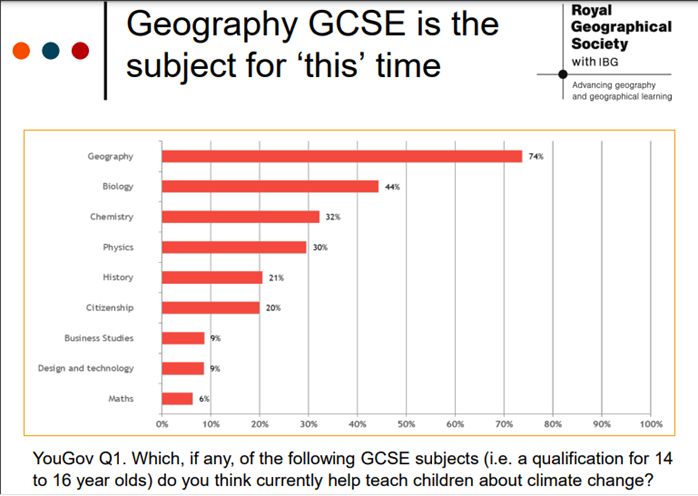
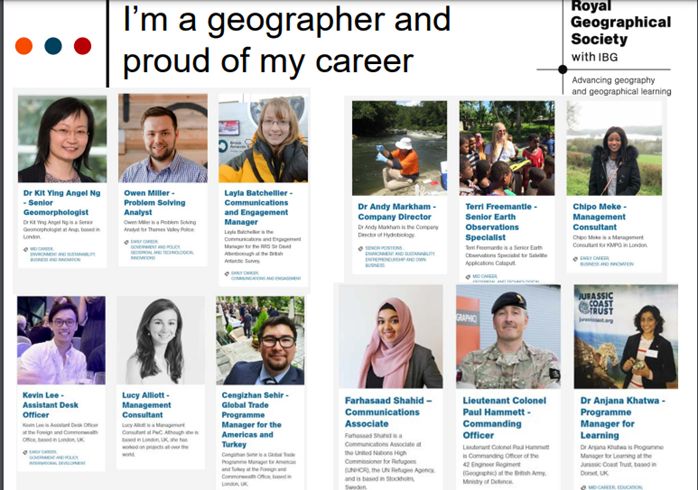
https://www.rgs.org/schools/teaching-resources/going-places-with-geography-video/
Click on the website below, which takes you to actual jobs sites and the current jobs linked to Geography they have today.
30 reason why geography really matters
https://www.prospects.ac.uk/careers-advice/what-can-i-do-with-my-degree/geography
